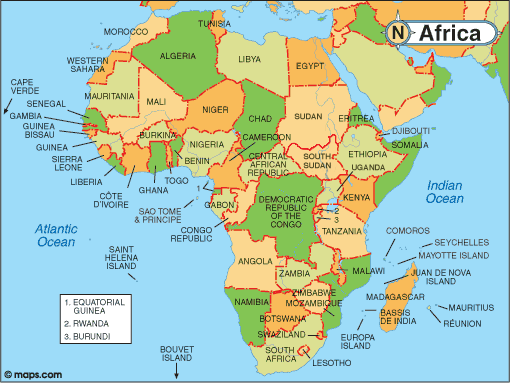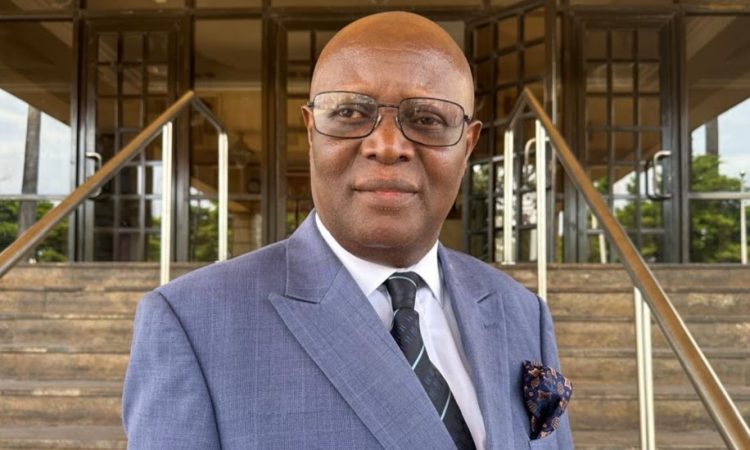
SANGOMAS are traditional healers and diviners in Southern Africa who intercede with the ancestors on behalf of their communities. In assessing Africa’s prospects in 2016, it is important to interpret the bones of the sangoma.
Starting in West Africa, Nigeria is even more dominant in its own sub-region than South Africa is in Southern Africa, accounting for 80% of the economy and about half of the population. President Muhammadu Buhari will have to manage the negative impact of low oil prices and a falling naira. His three priorities in 2016 will continue to be: efforts – with neighbouring Chad, Cameroon, and Niger – to vanquish Boko Haram’s murderous nihilism which has resulted in over 17,000 deaths since 2009; pursuing his relentless anti-corruption campaign to recover billions of dollars stolen by the ‘beasts of no nation’: members of a vile, rapacious, and unconscionable political class; and rebuilding the country’s infrastructure, strengthening manufacturing, and attracting greater investment.
The able former governor of Lagos State, Babatunde Fashola, will discover – as Bola Ige did before him – that there are deep structural challenges and embedded, venal interests in trying to restore Nigeria’s electricity sector. Any efforts to prosecute former President Goodluck Jonathan or his close associates for alleged corruption could trigger more restiveness among militants in the oil-producing Niger Delta in 2016. This year should, however, finally see the first visit to Nigeria of the first black president of the United States (U.S.), Barack Obama, on his farewell tour of Africa as he ends his eight years in the White House.
Stability will be critical in two important countries. Côte d’Ivoire’s Alassane Ouattara has restored economic growth, built infrastructure, and attracted back the African Development Bank (AfDB) to Abidjan from Tunis. He will, however, need to reconcile the supporters of his predecessor Laurent Gbagbo, who languish at the International Criminal Court (ICC) in the Hague awaiting trial for war crimes. Ghana will hold polls in December that could be the most hotly contested in decades, with the potential of violence. President John Dramani Mahama’s administration has faced many allegations of corruption, a tumbling cedi, and rolling black-outs, and has been forced into a rescue package by the International Monetary Fund (IMF).
This is the third and final chance for Nana Akuffo-Addo to win the presidency. Elections will also take place in Niger, Benin, and Cape Verde, with the last two set to replace incumbents. The eccentric, autocratic 21-year old rule of Gambia’s Yahya Jammeh will almost certainly continue after polls in November. Burkina Faso’s new president, Roch Marc Christian Kaboré (a former prime minister), will need to stabilise the political system and reform his army so that soldiers remain in their barracks. The re-elected Alpha Condé must heal rifts from a divisive election in Guinea last year, and along with Liberia and Sierra Leone, ensure that Ebola is finally vanquished. The Nigeria-led Economic Community of West African States (ECOWAS) peacekeeping force will continue to maintain stability in Guinea-Bissau, though much more funding is required for security sector reform. This must also be prioritised in Liberia and Mali where United Nations (UN) peacekeeping missions will continue to be needed in 2016.
In Southern Africa, South Africa accounts for 60 % of the subregion’s economy and its corporate sector will continue to dominate retail and fast-food in many countries. The “rainbow nation” is, however, no longer at ease. 2016 could see the Rand continue to plummet; anaemic growth; sporadic power-cuts; service-delivery and student protests; and labour unrest in platinum and gold mines. The local government elections in May will be hotly contested, with the ruling African National Congress (ANC) desperately trying to hang on to Johannesburg, Tshwane (Pretoria), and Nelson Mandela Bay in Port Elizabeth. Any losses could further weaken a vulnerable President Jacob Zuma, whose recent bungling of the appointment of a finance minister inflicted potentially irreparable political damage. The contest to succeed him as ANC president in 2017 will also heat up this year, as his ex-wife, Nkosazana Dlamini-Zuma, is expected to step down as chair of the African Union (AU) Commission in Addis Ababa at the end of her four-year term to challenge deputy president, Cyril Ramaphosa, for the crown.
Elsewhere, oil-rich Angola – with 20% of the sub-regional economy – will continue to suffer the negative economic impact of low oil prices even as it borrows from the World Bank, China, and Brazil; and the kwanza may be devalued further. José Eduardo dos Santos has been in power for 36 years, and his rule continues to be challenged by civil society groups and the media. Instability is likely to continue in Lesotho in 2016 in a fractious political system worsened by the interventions of politicised military brass hats. Swaziland’s absolutist monarchy must also be closely watched, as should Mozambique where RENAMO (Resistência Nacional Moçambicana) rebels are spending their third year in the bush. In Zimbabwe, the increasingly frail 91-year old Robert Mugabe’s health will need to be closely monitored, even as vice-president Ernest Mnagagwa waits in the wings. Elections in neighbouring Zambia in September will see Edgar Lungu trying to cling on to power amidst falling copper prices and a disputatious ruling party.
Ethiopia and Kenya remain Eastern Africa’s giants with about 27% each of the sub-regional economy. Ethiopia has Africa’s second largest population – 94 million – after Nigeria, hosts the AU, and has been an active peacekeeper in Somalia (which is set to hold elections in August), Abyei, and Darfur. Its ruling party is, however, notoriously repressive (winning all 547 seats with its allies in last year’s parliamentary elections) and the political system is still dominated by securocrats, though there has been progress in building infrastructure, with a railway set to connect Addis Ababa to Djibouti this year. Kenya’s Uhuru Kenyatta will continue his anti-corruption drive to win back disillusioned voters, and his troops will remain in Somalia to battle al-Shabaab whose attacks have devastated Kenya’s tourism sector.
In Eastern Africa’s tragic twins, Burundi will continue its downward spiral, as President Pierre Nkurinziza persists with repressive measures in a bid to consolidate his constitutionally questionable third-term electoral victory. His neighbouring counterpart, Paul Kagame, has formally removed presidential term limits in Rwanda, and will continue his autocratic rule and meddling in the Democratic Republic of the Congo (DRC). Kagame’s regional ally, Uganda’s monarchical Yoweri Museveni, will similarly extend his own 30-year reign in elections next month. Oil-rich South Sudan’s two warlords – Salva Kiir and Riek Machar – will continue to wage a two-year civil conflict that has killed thousands and displaced 1.5 million people, even as regional and external actors continue mediation efforts.
In Central Africa, despite its two-decade conflict, the DRC still accounts for 34% of the sub-regional economy, while Cameroon accounts for 25%. Whereas the Congo’s Joseph Kabila is toying with a strategy of glissage (slippage) to extend his 14-year rule by possibly postponing polls scheduled for November, 82-year old Paul Biya will continue to consolidate his autocratic 33-year rule. In polls this year, the tyrannical Idriss Déby will bulldoze his way to a fifth presidential term in Chad, as will both Equatorial Guinea’s 73-year old Teodoro Obiang Nguema who has ruled for 36 years, and Congo-Brazzaville’s Denis Sassou Nguesso who shot his way to power in 1997 after an earlier 13-year rule. Gabon’s Ali Bongo Ondimba should also defeat a divided opposition in polls this year by means foul or fair. UN peacekeepers will continue seeking to calm the religious-fuelled conflict in the Central African Republic (CAR) which held presidential elections last month.
Finally, in North Africa, Egypt accounts for 40% of the sub-regional economy, while Algeria has a 24% share. Egypt’s military strongman, Abdel Fattah al-Sisi, will continue to rule as a Pharaoh, clamping down on media and democratic freedoms; persecuting the Muslim Brotherhood; and contributing to the Saudi-led military intervention in Yemen. This will, however, not resolve problems such as a falling pound, declining tourists, and increasing unemployment.
There will be continuing concerns about Algeria’s ailing 78-year old leader, Abdelaziz Bouteflika, even as le pouvoir (a shadowy clique of powerful securocrats and civilians that are thought to run the country) watches carefully amidst a falling dinar, lower oil prices, continuing corruption, and threats of terrorist instability. This year though could see the election of the first North African to chair the AU commission. If Dlamini-Zuma leaves the post, as expected, Algeria’s foreign minister, Ramtane Lamamra – who previously served as AU Peace and Security Commissioner between 2008 and 2013 – is one of the favourites to replace her. Anarchic Libya and fragile Tunisia will also need to be closely watched in 2016.
In assessing Africa’s prospects in the year ahead, it will be important to observe carefully the bones of the Sangoma at this sacred oracle inhabited by the spirit of the ancestors.
• Dr. Adekeye Adebajo is Executive Director of the Centre for Conflict Resolution, Cape Town, South Africa, and Visiting Professor at the University of Johannesburg.





